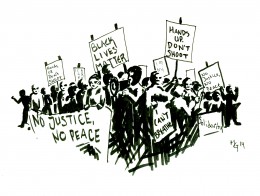
Spurred by the two recent grand jury decisions to not indict white police officers accused of killing unarmed black men, hundreds of students gathered on campus to protest. One of the largest and most diverse campus demonstrations in recent memory, the protest indicates that Binghamton University students do not view these court decisions as remote events, but as something that could happen in their own lives. We hope that this is only the beginning of increased political engagement on campus.
As SUNY students, holding government institutions accountable is our responsibility. Protest leaders reminded demonstrators that Eric Garner, a man from Staten Island killed by an NYPD officer, died on New York soil, and a public servant took his life. Regardless of one’s stance on race relations, students should be troubled that government employees charged with protecting the lives of citizens have violated precisely that, and have walked unhindered. For far too long we’ve been silent on the issues that matter, engrossed by our studies and personal lives.
While the scale of the protest showcased the student body’s political engagement, some student responses dishearteningly reinforced its importance. Several aggressively racist messages were posted on Yik Yak. These anonymous comments cannot be characterized as anomalous — they are attacks intended to disrespect minorities in the wake of tragedy and they are not uncommon on this campus. It was disappointing to see that when given the chance to engage in racist, hateful discourse anonymously on the internet, so many of our fellow students chose to do exactly that.
Other students complained about the disruptive nature of the protests during peak studying periods. The purpose of a protest is to occupy a physical area to raise awareness. A successful protest disrupts our routine and temporarily rouses onlookers from their complacency. Academic pursuit is valuable, but to hold it above civic duty betrays a lack of perspective. People were killed. Families are grieving. Communities feel alienated from their nation and feel anger toward injustice built into the system meant to house them.
The duty of a college student is to become educated, but narrowing the definition of education to schoolwork is a disservice. The protest’s organizers and attendants realized that, despite the crushing onslaught of finals week, there’s something more important: civic duty. It is a civic duty to learn about, understand and engage in the world beyond simply academic pursuit. Though students are entitled to their own opinions, the least we can do is allow our peers to peacefully show solidarity in a public space. In our effort to ace tests, we’ve forgotten our duty to organize and express discontent with the policies of the status quo.


